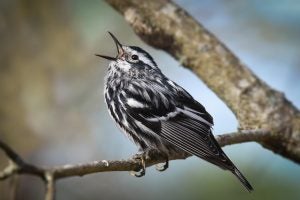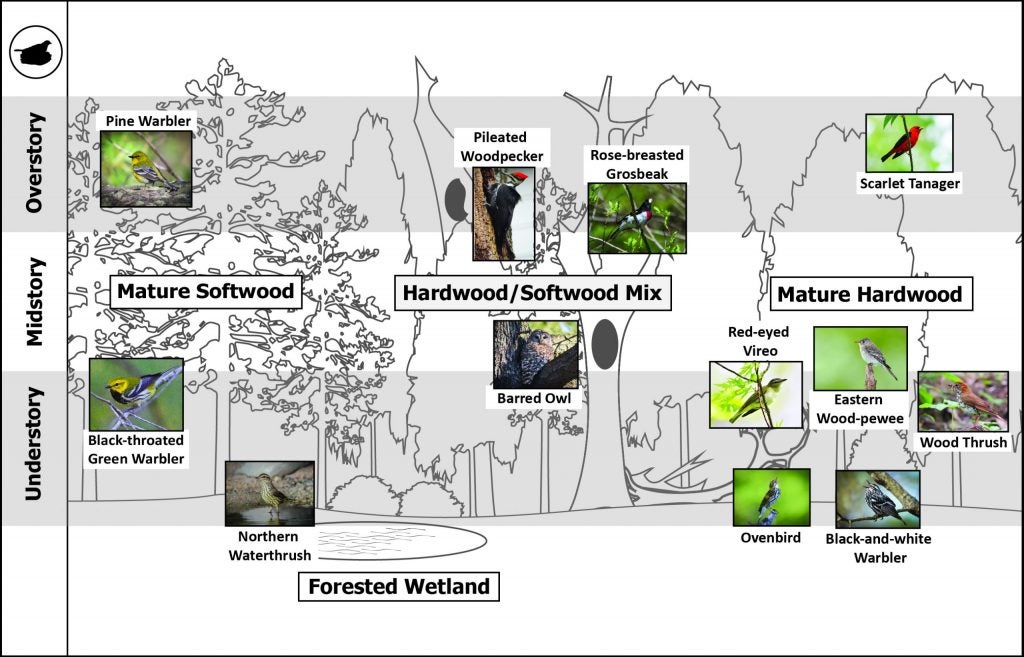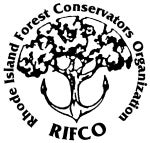
Black-and-white Warbler. Credit: Scott Martin
A Project of the Rhode Island Woodland Partnership
Program Overview
The Forestry for Rhode Island Birds project addresses threatened forest bird populations by educating landowners and natural resources professionals on the benefits of managing their land for forest-dependent bird species. This program began in Vermont, and the Rhode Island Woodland Partnership has adapted it for Rhode Island. The Rhode Island program included:
- creating two guides with information about restoring and enhancing the habitat of priority forest-dependent birds;
- holding workshops to train landowners and foresters on these techniques; and
- implementing specific silvicultural guidance at demonstration sites throughout Rhode Island.
Through this project, we identified 12 bird species – referred to in these guides as the Rhode Island Birder’s Dozen or “priority bird species” – that are emblematic of the conservation needs of forest birds in Rhode Island. The guides present silvicultural activities to enhance the habitat types of forest-dependent bird species, with a focus on the Rhode Island Birder’s Dozen.
The Rhode Island Birder’s Dozen
The Rhode Island Birder’s Dozen is made up of twelve forest birds that represent priority habitat types of conservation need in Rhode Island and were selected by the Rhode Island Woodland Partnership with the assistance of ornithologists from the University of Rhode Island, the Rhode Island Bird Atlas 2.0, the North American Breeding Bird Survey (BBS), and the Audubon Society of Rhode Island, and in consultation with the 2015 Rhode Island Wildlife Action Plan and data collected from neighboring New England states.
These twelve species in the Rhode Island Birder’s Dozen were selected because they:
- Are simple to identify by sight or sound;
- Collectively use a wide range of forest types and conditions for feeding and for breeding;
- Are showing a decline in their global breeding populations or are at risk for decline; and
- Are supported by large tracts of contiguous forest.
 The Rhode Island Birders’ Dozen. Credit: Judee Burr
The Rhode Island Birders’ Dozen. Credit: Judee Burr
The Guides
We produced two guides, which can be downloaded by clicking the links below:
- Forestry for Rhode Island Birds: A Guide for Foresters and Landowners to Manage Woodlots “With Birds in Mind
- Silviculture with Birds in Mind: Birder’s Dozen Pocket Guide for Rhode Island Foresters
Workshops
The original series of workshops about forestry for RI birds has now concluded, but contact us to inquire about possible future workshops.
- RI RC&D Director: Paul Dolan, (401) 500-0399, rircd2283@gmail.com
Demonstration Sites
Forest management techniques to support bird populations are being demonstrated at three sites in Rhode Island in partnership with Audubon Rhode Island. The Forestry for Rhode Island Birds program has partnered with the Norman Bird Sanctuary, the RI Forest Conservators Organization (RIFCO), and a private landowner to create these demonstration sites.
The Norman Bird Sanctuary is open to the public. View their hours, address, and programs on their website at: https://www.normanbirdsanctuary.org/
Learn more about RIFCO’s programs on their website here: http://www.rifco.org/
Why Manage for Bird Populations?
The woods of Rhode Island provide breeding habitat to dozens of threatened bird species. This is indicative of larger ecosystem problems, driven in part by habitat fragmentation and loss that impact bird breeding grounds, stopover habitats used during migration, and wintering habitat. Rhode Island is currently more than 55 percent forested, with the majority of woods owned by private landowners, but Rhode Island’s forests are becoming increasingly fragmented due to urbanization. In the last five years, silvicultural practices focused on creating early successional habitats have been implemented in Rhode Island to support wildlife. While these management strategies are beneficial to certain wildlife species, they are not sufficient to support many forest-dependent birds that require larger tracts of mature forest or forest interior to thrive. Many of these bird populations are declining.
The Forestry for Rhode Island Birds project addresses threatened forest bird populations by educating landowners and natural resources professionals on the benefits of managing their land for forest-dependent bird species. The Rhode Island Birder’s Dozen are emblematic bird species that residents can protect for the benefit of forest ecosystems and a wide range of other species.
Read more in Forestry for Rhode Island Birds: A Guide for Foresters and Landowners to Manage Woodlots “With Birds in Mind”
How to Get Involved
Read the Guides. The Forestry for Rhode Island Birds Guide can help you understand why managing for forest bird habitat is so important and which forestry techniques can support bird populations. You can learn the Rhode Island Birder’s Dozen with the help of the Pocket Guide.
Prepare a Forest Management Plan. Talk to your forester about managing for bird populations on your property. Find a list of foresters serving Rhode Island on the RI Woods website here: https://web.uri.edu/rhodeislandwoods/local-businesses/foresters/
Foresters can talk to landowners about opportunities to manage their forestland for bird populations. The opportunity to support wildlife can be an exciting motivator for landowners to undertake management activities.
More Information
The Forestry for Rhode Island Birds project was made possible by a Conservation Innovation Grant from the USDA Natural Resources Conservation Service. This project was implemented through the RI Woodland Partnership (RIWP) and managed by the Rhode Island Resource Conservation & Development (RI RC&D) Council. The RIWP – which is a collaborative of foresters, landowners, conservationists, and professionals who represent public agencies, small businesses, and non-profit organizations – aims to educate the public and forestry professionals in the management of forests using silvicultural practices that enhance the habitat of forest-dependent birds. The Foresters for the Birds program has been implemented in other New England states and provides land managers with the tools needed to effectively communicate with landowners about the benefits of managing forests with bird habitat in mind. Foresters for the Birds programs have been highly successful in enhancing bird breeding habitat and forest stewardship in New England in the states of Vermont, Massachusetts, Connecticut, and Maine, and the RI Woodland Partnership – with member organizations including the RI RC&D Council, the Forest Stewards Guild, the Audubon Society of Rhode Island, the University of Rhode Island, the Northern RI Conservation District, and the Rhode Island Forest Conservators Organization – has adapted this tool to forest birds of conservation need in Rhode Island through our project, Forestry for Rhode Island Birds.
Contact the RI Resource Conservation & Development Council with questions about the Forestry for Rhode Island Birds program.
- RI RC&D Director: Paul Dolan, (401) 500-0399, rircd2283@gmail.com








